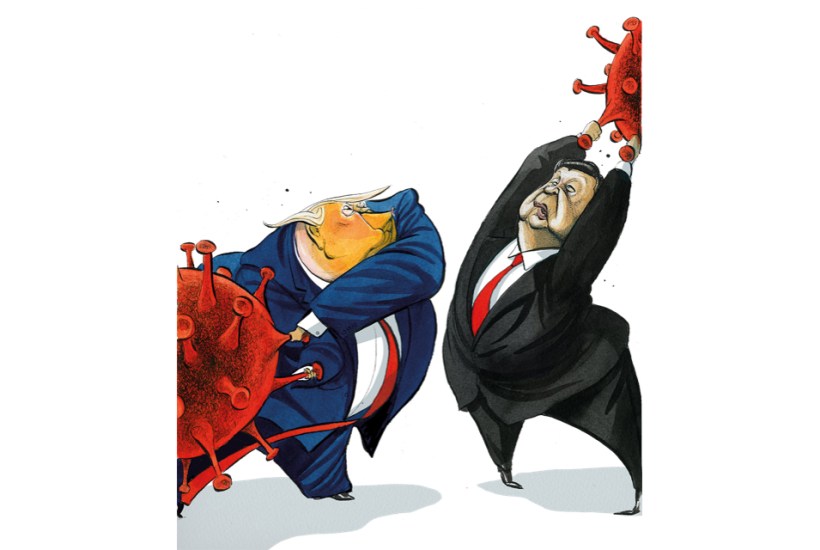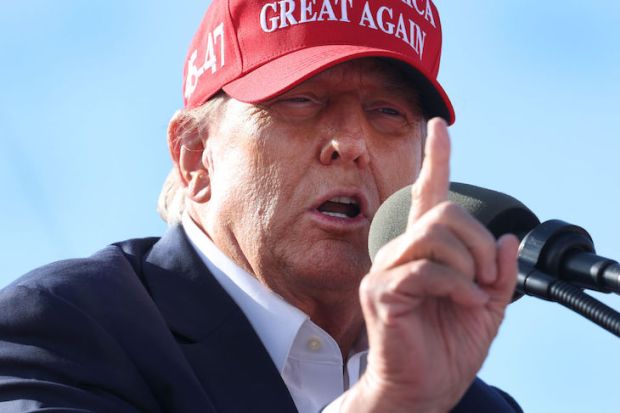This article is in The Spectator’s May 2020 US edition. Subscribe here to get yours.
The Covid-19 pandemic came along just as Cold War Two was getting under way between the United States and the People’s Republic of China — the superpowers of our time — with the European Union and a good many other US allies quietly hoping to be non-aligned. Far from propelling Beijing and Washington towards détente in the face of a common enemy, the new plague has only intensified the Cold War. For the first time, China’s campaign of disinformation has been on a Russian level, with wild anti-American conspiracy theories being disseminated by senior Foreign Ministry officials. As is well known, President Donald Trump retaliated by calling Sars-CoV-2 (the pathogen that causes the disease Covid-19) the ‘Chinese virus’ until persuaded to desist by his son-in-law Jared Kushner and the Chinese ambassador to Washington.
To some naive observers, China is going to win the corona wars. Yes, the virus may have originated in Wuhan, perhaps in one of the local wet markets where live wild animals are sold for their meat, or, more plausibly, in one of two biological research laboratories located in the city. Finally, after an initially disastrous Chernobyl-like sequence of events, the Chinese government has been able to get the contagion under control with remarkable speed — and now seeks to bend the online narrative in its favor, recasting itself as the savior rather than scourge of mankind.
I am not convinced. True, this may not be Xi Jinping’s Chernobyl. Unlike its Soviet counterpart in 1986, the Chinese Communist party has the ability to weather the storm and to restart the industrial core of its economy. Yet there is no plausible way that Xi can now meet his cherished goal of China’s economy this year becoming twice the size it was in 2010. That would need growth of at least five percent and Covid-19 has blown a hole in that target. Nor is Xi politically unassailable.
But that is not to say that the US will somehow emerge from the pandemic panic with its global primacy intact. It is not just that Trump bungled his response to the crisis (though he certainly did). Much more troubling is the realization that the parts of the federal government that are responsible for handling a crisis like this — supposedly, the genuine experts — bungled it too.
The Department of Health and Human Services is a mansion with many houses, but the ones that were charged with pandemic preparedness appear to have failed abjectly: not only the Centers for Disease Control and Prevention, but also the Food and Drug Administration and the Public Health Service, as well as the National Disaster Medical System.
This is not for want of legislation. In 2006 Congress passed a Pandemic and All-Hazards Preparedness Act, in 2013 a Reauthorization Act of the same name, and in June last year a Pandemic and All-Hazards Preparedness and Advanced Innovations Act. In October 2015 the bipartisan Blue Ribbon Study Panel on Biodefense, co-chaired by Joe Lieberman and Tom Ridge, published its first report, calling for better integration of the agencies responsible for biodefense. Last year, it was renamed the Bipartisan Commission on Biodefense ‘to more accurately reflect its work and the urgency of its mission’. On paper, the US was the most pandemic-prepped country in the world.
So let’s not pretend that the pandemic illustrates the case for big government. The US already has big government. And this is what it does: agencies, laws, reports, PowerPoint presentations…and then — when the endlessly discussed crisis actually happens — paralysis, followed by panic.
Today, the US has fallen back on the old 20th-century playbook of pandemic pluralism (states do their own thing; in some states a lot of people die), but combining it with the 2009-10 playbook of financial crisis management. The result is insane. A large chunk of the economy has been shut down by government order. The national debt is exploding, along with the balance sheet of the Federal Reserve.
Trump makes wild claims that he can reopen the economy over the heads of state governors. He plays tacky propaganda videos to the press corps he now holds captive. Meanwhile, we are nowhere near having the amount of testing — or the technology of contact tracing — that we need to end the lockdowns. As this debacle plays out, it is like watching the realization of all my earlier visions of the endgame of American empire — in Colossus (2004), Civilization (2011) and The Great Degeneration (2012) — but in fast forward.
History shows that plagues tend to be bad for big empires with weak frontiers: ask the Roman emperors Marcus Aurelius and Justinian. City-states are generally better at excluding pathogens, though there are many exceptions to that rule, from Periclean Athens onwards.
One reason all attempts to reunify Europe failed — from the time of Charlemagne to the time of Napoleon — was that recurrent pandemics incentivized the persistence of smaller polities, often with serious city walls and, by the 18th century, fortified borders (such as the Habsburg frontier at the Balkans). As no one European empire was able to beat the rest (typhus tended to terminate major military campaigns before a decisive outcome could be achieved), Europeans found it easier to conquer other peoples overseas. Those beyond the shores of Eurasia were easily overthrown because the unfamiliar European pathogens that accompanied the conquistadors and pilgrim fathers did most of the work. In the words of John Archdale, governor of Carolina in the 1690s, ‘the Hand of God [has been] eminently seen in thinning the Indians, to make room for the English’.
The west European maritime empires of the 19th and 20th centuries were exceptional because they set out to vanquish not only native populations but also pathogens. As the tropical medicine expert Sir Rubert William Boyce put it in 1910, whether or not there would be a European presence in the tropics boiled down to this: ‘Mosquito or Man’. ‘The future of imperialism,’ the Canadian doctor John L. Todd wrote in 1905, ‘lay in the microscope.’
Yet the strengths that once made western societies so dominant have waned. Our public institutions have so decayed that they cannot cope with a novel coronavirus that is both more contagious and more deadly than influenza, even when the emergence of such a pathogen was quite likely. (Just three years ago, for example, Britain’s astronomer royal Lord Rees bet the Harvard psychologist Steven Pinker that ‘a bioterror or bioerror’ would ‘lead to one million casualties in a single event within a six-month period starting no later than December 31 2020’. Lord Rees may yet win that bet. Alas, the stake was only $400.)
Last year, the new Global Health Security Index ranked the US first and the UK second in the world in terms of their ‘global health security capabilities’. Wrong. A new league table of coronavirus health safety by the Deep Knowledge Group puts Israel, Singapore, New Zealand, Hong Kong and Taiwan at the top. (Iceland deserves an honorable mention, too.)
The key point is that there are diseconomies of scale when a new pathogen is on the loose. Four of those small countries, in their different ways, had reasons to be paranoid in general and laser-focused on the danger of a coronavirus made in China. They had learned the lessons of Sars and Mers (also caused by coronaviruses). By contrast, the big global players — China, the United States and the EU — have all done terribly, each in their own distinctive way.
What will the political outcome be? It is clearly more likely that Trump loses in November than that Xi is overthrown by his party rivals, so you should probably bet on that outcome. Like Warren Harding in 1920 (the post-war, post influenza election), Joe Biden — who now carries Barack Obama’s endorsement — is Mr Normalcy. All he needs to do is avoid dying. For Beijing, of course, President Biden would be a dream come true, as he was the only pro-Chinese candidate in the Democratic primary field, aside from Mike Bloomberg. The big question is who would succeed Biden if he keels over (as Harding did). Heaven help us if it’s another person with the name Warren.
But be careful what you wish for, General Secretary Xi. There cannot be a hegemonic transition unless (as with the US and the UK circa 1945) the rising power is ready for prime time. China isn’t. As Gideon Rachman of the Financial Times pointed out, nobody wants its currency and not many people want its education.
No, however much Trump and Xi may clash over Covid, the winners in the short run are none of the above empires. The winners are the city-states. Of course, Israel, Singapore and Taiwan cannot punch that much above their weights; great power status is beyond their grasp. The question is who gains from this stunning demonstration that in a pandemic, small is beautiful. On balance, I would say the centrifugal forces unleashed by the pandemic are a much bigger threat to a monolithic one-party state than to a federal system already in need of some decentralization. Any victory Xi seems to win in the corona wars will be pyrrhic. After the debacle, the US will have the chance seriously to address the two biggest defects of its system: the confusion of politics with showbiz (which produced Trump) and the chronic sclerosis of the deep state (which also produced Trump).
A final reflection. As the data on Covid-19 mortality by age cohort shows, this is no virus for old men. When the dust clears in about 12 months’ time — when there’s a vaccine and therapies — the world will be halfway to herd immunity anyway, because lockdowns are just intolerable for more than a couple of months. Between now and then, I fear, a lot of elderly and infirm people will be carried off early, along with many doctors and nurses, who are most exposed to the virus, plus a smallish proportion of plain unlucky younger people.
The nasty, barely writable truth is that, as a result, the problem of aging societies and rising dependency rates will have been solved: people over 70 will go back to being considered ineligible for high office and other positions of responsibility. Young people, who have been the economic losers since 2008, will find themselves the winners — assuming the central banks eventually lose their bizarre fight to inflate asset prices above wages.
Now, in this new post-plague world, where will the best opportunities be for the world’s ambitious young people? China? Europe? Or America? You know the answer. And to which of the three empires do the successful city-states, even now — even after all the bungling — feel the most loyalty? You know that answer, too.
Niall Ferguson is the Milbank Family Senior Fellow at the Hoover Institution, Stanford, and managing director of Greenmantle. He is a weekly Comment columnist for the Sunday Times of London. This article is in The Spectator’s May 2020 US edition. Subscribe here to get yours.
See the full story of Who will win the corona wars? on Spectator USA.
Got something to add? Join the discussion and comment below.
Get 10 issues for just $10
Subscribe to The Spectator Australia today for the next 10 magazine issues, plus full online access, for just $10.




















Comments
Don't miss out
Join the conversation with other Spectator Australia readers. Subscribe to leave a comment.
SUBSCRIBEAlready a subscriber? Log in